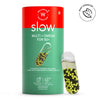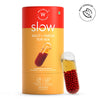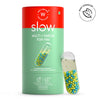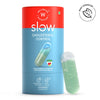Cholesterol is essential for body functions, but excess LDL ("bad") cholesterol can lead to artery blockages and heart disease. While medications are the basis of cholesterol management, natural ingredients like Omega-3 and plant sterols offer additional support. By understanding their benefits and incorporating them into your lifestyle, you can take a proactive approach to heart health.
Understanding Cholesterol and Its Impact on Health
Cholesterol is a waxy, fat-like substance found in the body that plays a key role in building cell membranes, producing hormones, and synthesizing vitamin D. However, excessive cholesterol—particularly LDL (low-density lipoprotein)—can accumulate in the arteries, leading to blockages and increasing the risk of heart disease and stroke. On the other hand, HDL (high density lipoprotein) helps remove excess cholesterol from the bloodstream and transports it to the liver for elimination.
An imbalance in these cholesterol levels, often caused by poor diet, lack of exercise, and genetic predisposition, can increase cardiovascular risks.
The Power of Omega-3 for Cholesterol Management
Omega-3 fatty acids—particularly EPA (eicosapentaenoic acid) and DHA (docosahexaenoic acid)—are essential for cardiovascular health. These fatty acids, found in fatty fish, algae, and high-quality supplements, have been extensively researched for their cholesterol-regulating properties. Here are 3 key benefits of Omega-3 for cholesterol management:
2. Reducing Triglycerides
High triglycerides can increase the risk of heart disease. Omega-3s have been shown to reduce triglyceride levels by up to 30%, lowering the overall lipid burden in the bloodstream [NIH].
2. Increasing HDL (“Good”) Cholesterol
Omega-3s help raise HDL cholesterol, which assists in clearing excess LDL from arteries, promoting better cardiovascular function [NIH].
3. Reducing Inflammation
Chronic inflammation in the arteries can lead to the formation of plaques and blood clots. Omega-3s possess powerful anti-inflammatory properties that protect arterial walls and improve circulation.[NIH]
Plant Sterols: Nature’s Cholesterol Blockers
Plant sterols, also called phytosterols, are naturally occurring compounds found in fruits, vegetables, nuts, and whole grains. Structurally similar to cholesterol, they compete with cholesterol for absorption in the intestines, effectively lowering LDL levels without affecting HDL cholesterol. Here’s how plant sterols work:
1. Block Cholesterol Absorption
By mimicking cholesterol, plant sterols reduce the amount of cholesterol absorbed in the intestines, leading to lower LDL levels. [NIH]
2. Lower LDL Levels Naturally
Plant sterols have been shown to lower LDL cholesterol by 5-15%. According to the American Heart Association (AHA), consuming at least 2 grams of plant sterols daily can effectively support healthy cholesterol levels.
3. Safe and Effective
Unlike statins, plant sterols work naturally without significant side effects, making them a preferred choice for those seeking holistic heart health solutions.
Diet Support for Cholesterol Management
A heart-healthy diet plays a crucial role in managing cholesterol levels. When combined with cholesterol-lowering supplements, it can significantly improve heart health and reduce the risk of cardiovascular diseases. Here’s what to focus on:
1. Increase Fiber Intake
Soluble fiber binds to cholesterol in the digestive tract, preventing it from being absorbed into the bloodstream. This helps lower LDL ("bad") cholesterol levels while promoting overall gut health.
-
Best sources: Oats, beans, lentils, chia seeds, flaxseeds, apples, oranges, and citrus fruits.
-
Tip: Aim for at least 25-30 grams of fiber per day for optimal cholesterol control.
2. Prioritize Healthy Fats
Replacing unhealthy saturated and trans fats with heart-friendly unsaturated fats can help lower LDL cholesterol while maintaining or even increasing HDL ("good") cholesterol.
-
Best sources: Avocados, extra virgin olive oil, almonds, walnuts, flaxseeds, and fatty fish (such as salmon, mackerel, and sardines).
-
Tip: Use olive oil instead of butter when cooking and opt for nuts or seeds as a healthy snack.
3. Reduce Processed and Sugary Foods
Highly processed foods and added sugars contribute to inflammation, weight gain, and higher cholesterol levels. Cutting down on these foods helps maintain a healthier lipid profile.
-
Avoid: Refined grains (white bread, pasta), sugary snacks, sodas, processed meats, and trans fats (found in fried and packaged foods).
-
Tip: Swap white rice for quinoa or brown rice, and replace sugary snacks with fresh fruits or nuts.
4. Include Omega-3-Rich Foods
Omega-3 fatty acids are essential for heart health, helping reduce triglycerides, lower blood pressure, and support arterial function.
-
Best sources: Fatty fish like salmon, mackerel, and sardines, as well as plant-based sources like chia seeds, flaxseeds, and walnuts.
-
Tip: Try to eat at least two servings of fatty fish per week or consider a high-quality Omega-3 supplement for additional support.
5. Incorporate Plant Sterol-Rich Foods
Plant sterols naturally compete with cholesterol for absorption in the intestines, reducing LDL levels while keeping HDL cholesterol intact.
-
Best sources: Nuts, seeds, whole grains, legumes, and fortified foods such as plant-based spreads, yogurt, and orange juice.
-
Tip: Consuming at least 2 grams of plant sterols daily has been shown to effectively lower LDL cholesterol.
Lifestyle Changes for Better Heart Health
Small daily habits can significantly impact cholesterol levels and overall heart health. Consider these lifestyle modifications:
1. Engage in Regular Exercise
Physical activity helps increase HDL cholesterol and lower LDL cholesterol.
-
Best practices: Aim for at least 150 minutes of moderate aerobic exercise per week, including walking, cycling, or swimming.
2. Manage Stress Effectively
Chronic stress raises LDL cholesterol and contributes to inflammation.
-
Effective strategies: Meditation, deep breathing, yoga, and quality sleep.
3. Maintain a Healthy Weight
Excess weight, particularly around the abdomen, contributes to high cholesterol.
-
Healthy approach: Balanced eating combined with regular movement.
4. Quit Smoking and Limit Alcohol
Smoking reduces HDL cholesterol and damages arteries, while excessive alcohol consumption raises triglycerides.
-
Recommendation: Quit smoking and limit alcohol to moderate levels.
Choosing the Best Supplements for Cholesterol Management
For those seeking additional support, high-quality cholesterol-lowering supplements can enhance results. However, not all supplements are created equal. When selecting the right option, consider the following factors:
-
Omega-3s with EPA and DHA: Choose a supplement that provides a clinically effective dose of these essential fatty acids to support heart health and reduce triglycerides.
-
Purity and Potency: Look for supplements that undergo third-party testing to ensure they are free from heavy metals, contaminants, and unnecessary fillers.
-
Plant Sterol-Based Formulas: Opt for scientifically backed ingredients that have been shown to reduce LDL cholesterol naturally.
-
Clinically Tested, High-Purity Ingredients: Choose supplements that have been validated for their effectiveness in managing cholesterol levels.
-
Sustainably Sourced Ingredients: Select products that prioritize environmentally responsible sourcing, ensuring both purity and ethical production.
Wellbeing Nutrition offers two high-quality supplements designed to support heart health. Triple-Strength Omega-3 provides a potent dose of 620mg EPA and 397mg DHA, essential fatty acids known to reduce triglycerides, lower inflammation, and promote cardiovascular function. Meanwhile, Cholesterol Control is formulated with clinically backed plant sterols, including CoroWise™ and Vegapure®, which help block cholesterol absorption and maintain healthy LDL levels. These supplements offer a clean, effective, and science-backed approach to cholesterol management.
Final Thoughts
Managing cholesterol naturally is all about balance—choosing the right foods, staying active, and incorporating science-backed supplements like Omega-3s and plant sterols. These powerful nutrients work together to reduce triglycerides, lower LDL cholesterol, and support overall heart health. By making small but consistent lifestyle changes—such as eating fiber-rich foods, prioritizing healthy fats, and staying active—you can take control of your cholesterol levels and protect your heart in the long run. A healthier heart starts with daily choices, and every step you take today leads to a stronger, healthier future.































 DOWNLOAD NOW
DOWNLOAD NOW
